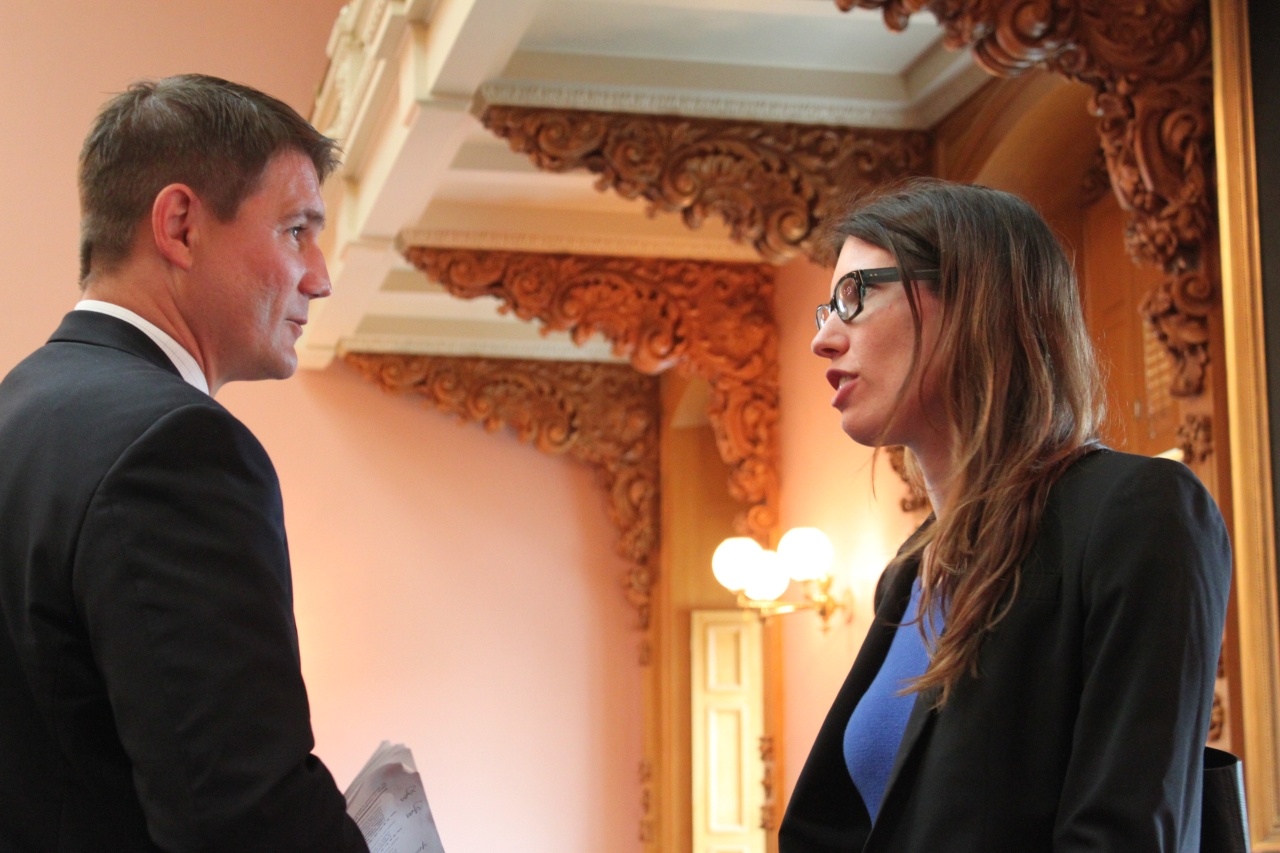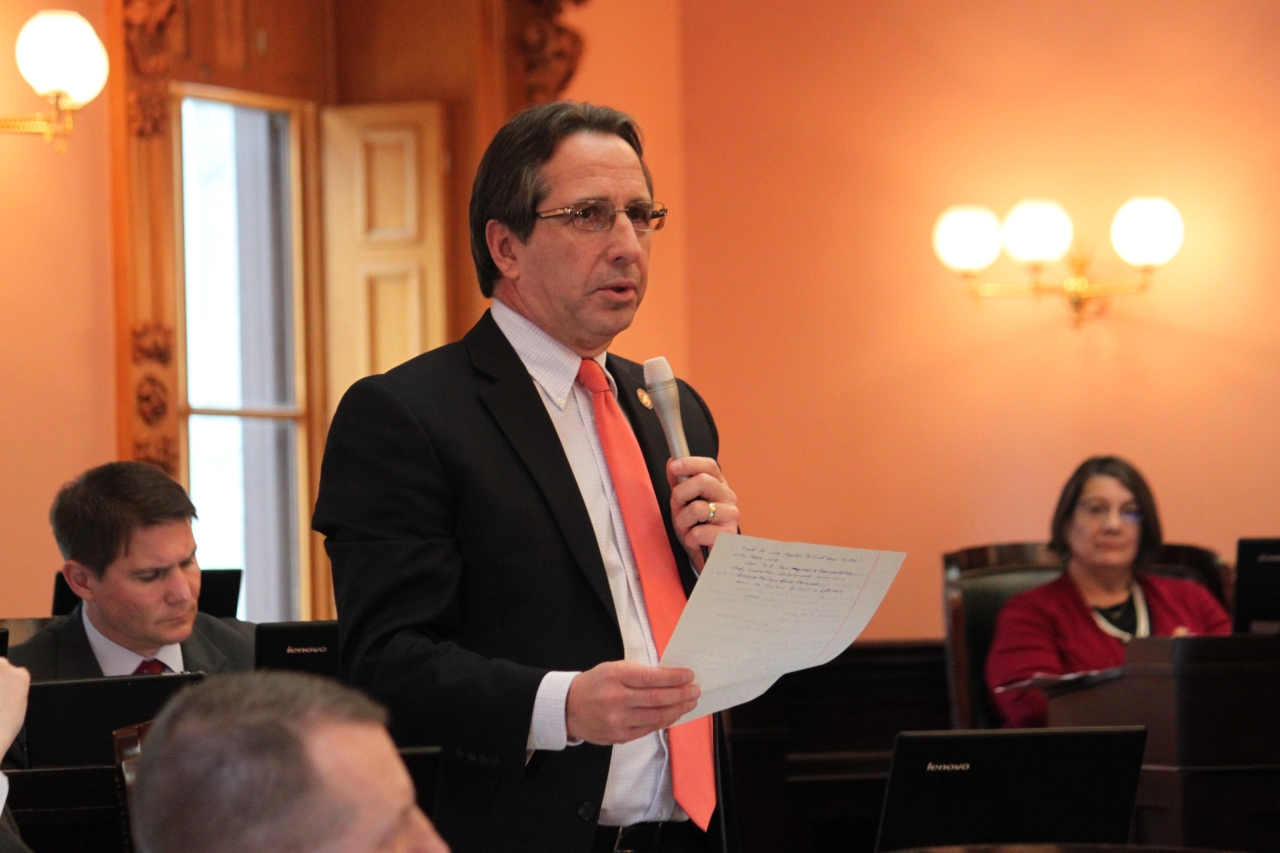Democratic News
Featured Stories
News Feed
State Reps. Adam C. Miller (D-Columbus) and Bernadine Kennedy Kent (D-Columbus) recently introduced new legislation titled the School Safety Drill bill to help improve emergency response readiness in school districts across the state.
“With a new academic year upon us, school safety is on the minds of parents and remains a hot-button issue in every state, but especially here in Ohio,” said Kennedy Kent, a former high school principal and longtime teacher. “When students, teachers and staff finally get together after summer break, I believe it is important to review emergency procedures as soon as possible to ease stress and ensure everyone in the facility is on the same page.”
House Democratic Leader Fred Strahorn (D-Dayton) issued the following statement in response to the state auditor’s request that management companies, charter school sponsors and vendors reimburse the state when a charter school itself is overpaid for services that were never rendered, as was the case with a $60 million finding against the failing online charter school, ECOT:
“The state auditor is right to pursue overpayments to any and all parties that wrongly receive tax dollars for services that weren’t provided. The General Assembly should be inspired by the auditor’s appetite for following the money, and elected officials at all levels should look closely at how they may have personally benefitted from the free flow of taxpayer dollars to charter school operators and then to campaign accounts.”
State Rep. Thomas E. West (D-Canton) expressed outrage regarding the U.S. Department of Justice’s decision to support Ohio Secretary of State Jon Husted’s voter purge. Department attorneys filed an amicus brief on Monday reversing the Department’s previous position by arguing that Husted was legally permitted to unregister voters who have not voted for six or more years.
“I am outraged that the Trump administration has chosen to attack the most fundamental right of every citizen living in a democracy,” said West. “Nobody should be punished so dramatically for choosing not to vote in a given year. Jon Husted and Donald Trump do not have the right to strip Americans of our rights just because we do not vote as often as we can.”
This decision from the Department of Justice comes in the wake of President Trump’s creation of a voter fraud commission, which recently received nationwide pushback in its efforts to collect the private information of every registered voter in the country. According to the ACLU of Ohio, the Trump administration’s decision to support voter purge measures undoes decades of efforts from the Department of Justice to prevent similar efforts.
“This is not a partisan issue. Both Democratic and Republican presidents have fought for decades to protect the right of every citizen to vote,” said West. “It really is sad to see the Trump administration support Jon Husted’s movement to disenfranchise millions of voters across our country. Unfortunately, this is quickly becoming part of a pattern of voter suppression from this White House.”
The Supreme Court will make a decision on the case this summer.
State Rep. Catherine D. Ingram (D-Cincinnati) today announced her position on the updated Ohio Every Student Succeeds Act (ESSA) plan which will be submitted to the U.S. Department of Education in September.
Every Student Succeeds Act, which replaced its predecessor, the No Child Left Behind Act, is the federal requirement for states to submit plans regarding the use of federal educational funding for school curriculum.
“After several revision and updates, there is still much work to do, and Ohio’s ESSA proposal is not perfect,” said Ingram. “However, there has been some improvement in the overall plan, and there is now much more agreement in certain sections of the proposal than there was during the debates in April.”
Every State educational agency had the choice to submit its ESSA proposal in either April or September. Ohio’s plan is being prepared to submit by the September deadline.
Ohio’s ESSA plan can be viewed online at www.educationa.ohio.gov/ESSA.
State Rep. Thomas West (D-Canton) today announced that Canton, Ohio has been selected to host the Ohio Legislative Black Caucus’ 50th anniversary celebration this fall. African American state lawmakers from all across Ohio will convene in Stark County for the two-day event on October 1-2 to recognize the important milestone and chart a course for the future for the historic legislative organization.
“I am thrilled to host my OLBC colleagues here in Canton and show off all that is great about our community,” said state Rep. Thomas West, the co-chairman for the event. “Exciting projects like the Pro Football Hall of Fame development, its African American apprenticeship program and significant events like the OLBC 50th Anniversary are all evidence of Canton’s positive momentum. We encourage all elected officials on the local, state and national level to join us for this wonderful evening of fun and enlightenment. This event is a once in a lifetime occasion, which is why we have invited the governor as well as leaders from both the House of Representatives and Senate to attend and share this experience with our community.”
State Reps. Nickie J. Antonio (D-Lakewood) and Janine Boyd (D-Cleveland Heights) yesterday introduced legislation to better protect victims of domestic violence from their abuser by requiring those convicted of a domestic violence crime or served a civil protection order (CPO) to temporarily turn over their firearms to law enforcement.
“Separating deadly weapons from a domestic abuser weakens their power over the victim. By stopping gun violence before it starts, we can stop burying innocent people who should have been legally protected under a CPO,” said Antonio. “It’s common sense: domestic abusers should not have access to guns.”

Rep. Kathleen Clyde (D-Kent) today called for further action against ongoing efforts by the president’s “Election Integrity Commission” to obtain American voters’ data. She called on Ohio Secretary of State Jon Husted to stop sharing Ohio voters’ personal information through any channel with Kansas Secretary of State and Commission leader Kris Kobach.
“Ohio must stop putting our voters’ personal information at risk,” said Rep Clyde. “Our Secretary of State must stop sharing Ohio voter data, including the last four digits of Social Security numbers (SSN4), with Secretary Kris Kobach’s Interstate Crosscheck program, a pre-cursor to the president’s so-called Election Integrity Commission. And Secretary Husted must assure Ohioans that voter data he has already shared with Kobach will not be used for the president’s sham voter fraud commission.”

Over objections from state Controlling Board member Rep. Jack Cera (D-Bellaire), the Republican-controlled panel tasked with oversight of state spending approved a Kasich Administration request today to pay off a Grand Lake St. Marys landowners’ lawsuit against the state using severance tax revenue from the Ohio Department of Natural Resources oil & gas fund. Republicans slipped the maneuver into the state budget at the eleventh hour with no debate or notice.
“Lawmakers should be held accountable for resorting to one-time cash-grabs and shell games to prop up unstable budgets and poor job growth,” Cera said. “This sheds new light on the dangerous and dishonest financial tricks lawmakers will play to bolster political talking points. This funding should be used to put people back to work in Eastern Ohio at good-paying jobs that can sustain a family and let us plan for our future.”
The cash-grab to pay off the almost decade-old lawsuit makes use of some $15 million in severance tax funds that are normally required to be used for related oil and gas drilling needs in impacted communities. Republicans state lawmakers already transferred $10 million from the fund to prop up the state budget shortfall early in June.
“This multi-million-dollar cash grab by the state shows where Columbus politicians’ priorities are – not with hardworking taxpayers and property owners in Eastern Ohio,” Cera added. “After almost ten years to plan for a lawsuit settlement in the western part of Ohio, state officials failed to responsibly plan for the future and instead are robbing our area of what’s rightfully ours.”
The settlement comes on the heels of the state budget vote. Cera tried to amend the budget to dedicate at least $10 million in severance tax money for infrastructure repairs and related services in Eastern Ohio communities. His efforts were defeated along party lines.
In a political effort to hamstring Ohio House Democratic lawmakers in a pro-gun, anti-gun debate today on the House floor, Republicans brought forward House Bill (HB) 233 for a vote, legislation that allows concealed carry permit holders to knowingly bring guns or deadly weapons into daycares, schools, airports, bars and other restricted spaces, so long as the permit holder leaves when asked to do so. Individuals who refuse to leave or return to the same business while carrying a prohibited weapon within 30 days will be subject to a fourth degree misdemeanor.
“This isn’t just a solution looking for a problem, but it is creating a whole new set of public safety problems by overturning Ohio laws designed to keep us safe and secure,” said House Democratic Leader Fred Strahorn (D-Dayton). “This will trample private property rights of business owners and create confusion in secure locations like airports, police stations, schools and daycares. As a gun owner and strong second amendment supporter, I think Ohioans deserve to feel safe and secure, free from the fear of intimidation or tragedies this bill could create,” added Strahorn.
Today, the Republican-controlled Ohio House of Representatives overrode eleven items Governor John Kasich vetoed in the recently passed state budget, House Bill (HB) 49. Under the House’s overrides, Medicaid expansion will have to be reauthorized through the state Controlling Board and new taxes on working people could be put in place as a condition of healthcare coverage – if the Senate takes up the House overrides.
“After six years and almost two-billion dollars in Republican cuts to local communities, it’s our responsibility to take an all-of-the-above strategy to rebuild and restore our economic engines – our local communities,” said House Democratic Leader Fred Strahorn (D-Dayton). “While Ohio’s economy teeters on the verge of recession, we need to put our communities and local taxpayers in the best position possible to plan for their future and invest in job creation and community development.”






